专四语法之反义疑问句
专四语法 反意疑问句
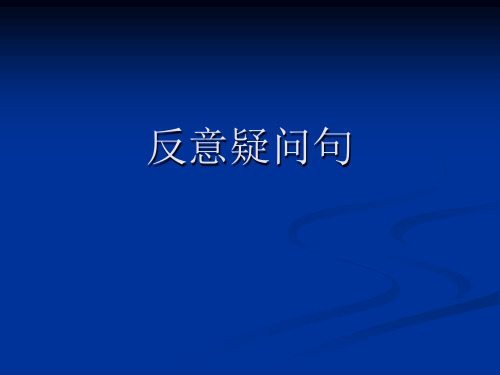
⒑ 当陈述部分的主句是I suppose, I think, I believe, I imagine等结构时,反意疑问部分 往往与从句保持一致,而且要注意否定转 移。如: ①I suppose that she is careful, isn’t she? ② I don’t believe she has gone home, has she? ③ I don’t think he can do it well, can he? ④I don’t guess he knows it, does he?
3. When you have finished with the book, don’t forget to return it to Tim, ____? (11, 54) A. do you B. will you C. don’t you D. won’t you [B]
ቤተ መጻሕፍቲ ባይዱ
⒉ 当陈述部分的主语是everything, anything, nothing, something等表物的不定代词时,反意疑 问部分的主语常用it.如: ① Everything has been done on how to prevent the pollution, hasn’t it?
◆ Let’s 和Let us都表示“让我们”,但用法上不 同。前者包括听话人,后者不包括听话人。正因 如此,它们的反意疑问句的形式常常不同: 以Let’s 开头的祈使句,反意疑问部分常用 shall we. 以Let us开头的祈使句,反意疑问部分常用 will you. 如:
专四反义疑问句句型归纳

反义疑问句句型归纳1、Y ou had no time for reading, did you ? \ had you?2、He has a brother, hasn’t he, \ doesn’t he?3、We have to go without him, don’t we ?4、Y ou have your dinner at school, don’t you?5、He has a rest every two hours, doesn’t he?6、This is yo ur last chance to learn from the beginning, isn’t it?7、Those were terrible days for us to recall, weren’t they?8、There are some books you are interested in, aren’t there?9、Let us do it as we please \ like to, will you? \ can you?10、Let’s us do it r ight now, shall we? \ can we?11、Come here, will you? \ won’t you \ can you \ can’t you \ do you \ don’t you?12、Don’t say anything, will you? \ can you? \ do you?13、Tom, you clean the window, will you?14、I think \ say \suppose \ guess \ am sure he w ill come back soon, won’t he?15、I don’t think he will come back , will he?16、He old man never thought he was lonely, did he?17、The old man used to be a farmer, usedn’t he \ didn’t he?18、He ought to come, oughtn’t he \ shouldn’t?19、He seldom goes to the cinema, doesn’t he?( hardly, never, few, little, nothing, nobody)20、It’s unfair, isn’t it?21、One can’t be careful enough, can one \ can he?22、Everything goes well, doesn’t it?23、Everybody agrees with him, doesn’t he \ don’t they?24、All w e needed has been bought, hasn’t it?25、All we invited have arrived, haven’t they?(All refers to people)26、Learning English is very hard, isn’t it?27、He studies hard and he is often praised by his teachers, isn’t he?28、We must be more polite in this occasion, needn’t we?29、He must be a brave man, isn’t he?30、It must have rained last night, didn’t it?31、He mush have known the answer, hasn’t he?32、He can’t have done such a foolish thing, has he?33、I am a student, aren’t I ?34、So he has known the secret, has he?35、Oh, you have the same type of sell phone as I, do you?反义疑问句注意一、反义疑问句是疑问句的一种,它对陈述部分的事实提出相反的疑问,形式上是一个省略问句,附加在陈述句后,即:陈述句+ 逗号+ 省略问句+ 问号Y ou are from America, aren’t you?注意二、遵循前否定后肯定或前肯定后否定的原则(但在祈使句等一些特殊句子中需注意,详细见注意七)Jim isn’t in Class Four, is he?注意三、附加疑问句必须前后两句主语相同Mr Zhang has been here for four years, hasn’t he?注意四、附加疑问句部分与主语不一致的若干情况如下(需牢记)1.this 或that改it,无论是否指人This is your brother, isn’t it?2. these或those改theyThose are books ,aren’t they?3. 不定代词one改one或heOne can’t be always young, can one / he?4. something、anything、everything和nothing改itNothing is serious, is it? (注意为什么后面用is it而不是isn’t it?)Everything seems all right, doesn’t it?5. everybody、everyone、somebody、someone、anybody、anyone、nobody改they或he(任选,但选定后注意单复数形式)Everyone knows this, don’t they / doesn’t he?Nobody likes to lose money, does he? (这里最好用he)6.each of改he或theyEach of the boys had an apple, didn’t he / they?7. no one, none, neither, either改they 或heNo one came, did they?8. some of…、none of …改it、they或you(联系上下文或句子)None of the food was delicious, was it?Some of the dustmen have come back, haven’t they?9. 由neither…nor…、not only…but also、both…and…、either…or…、not…but…、…or…、…and…等连接的并列主语,改复数代词Neither you nor I am wrong, are we?Both Tom and Jack came, didn’t they?10. 由动词不定式、动名词、从句或词组构成的主语,改itTo learn English well isn’t easy, is it?Swimming is great fun, isn’t it?11. the + 形容词表示一类人,改复数代词The poor had no right (权力) to speak at the time, did they?12. there 引起的句子(There be句型等),仍用thereThere stands a house and a lot of trees, doesn’t there?There are many children in the park, aren’t there?注意五、附加疑问句部分与谓语不一致的若干情况如下(需牢记)(初中阶段14点18点和19点可以常识性了解)1. have (有)改have或doMary has two brothers, doesn’t she / hasn’t she?2. have (有)必须与陈述部分一致He hasn’t a lot of time, has he?Miss Green doesn’t have any money in her pocket, does she?3. have不做“有”解释,必须用doThey all have a good time, don’t they?4. have to用do或haveWe have to g et up early, don’t we / haven’t we?5. have got to用haveWe have got to answer all the questions, haven’t we?6. had better用should或hadWe had better go right now, shouldn’t we / hadn’t we?7. can’t(不可能,表示推测)根据can’t或的动词选择相应的形式He can’t be a doctor, is he?The workers can’t have finished their work, have they?8. may 用may + 主语+ not (英语中不用mayn’t)They may be here next week, may they not?9. must(必须)用needn’tY ou must do it today, needn’t you?10. must(应该)用mustn’tI must study hard, mustn’t I?11. mustn’t用must或mayY ou mustn’t talk like that, must you?We mustn’t stay here any longer, must we?12. “must be”对现在情况进行推测作一般现在时或现在进行时的附加疑问句进行处理2 反义疑问句He must be happy, isn’t he?He must be working hard at the office, isn’t he?must表示推测时,也有用mustn’t的He must have been working very hard, mustn’t he?Y ou must have told Mr Wang the secret, mustn’t you?13. “must + 完成时”表示对过去情况的推测,作一般过去时附加疑问句处理He must have come yesterday, didn’t he?Y ou must have seen the play last week, didn’t you?14. “must + 完成时”用来推测过去的动作持续到现在按现在完成时的附加疑问句来处理Y ou must have studied English for years, haven’t you?He must have lived here for at least ten years, hasn’t he?14. 实义动词need和dear用doHe needs help, doesn’t he?I have never dared to ask him, have I?15. 情态动词need和dear用need和dearHe dare not say so, dare he?We need not do it again, need we?16. needn’t 用need或mustY ou needn’t go yet, need you?He needn’t do that, must he?17. “ would rather + 动词原形”和“would like to + 动词原形”用wouldn’tHe would rather read the t ext ten times than recite it, wouldn’t he?Y ou’d like to have some bananas, wouldn’t you?18. “ought to + 动词原形”用oughtn’t 或shouldn’tThe child ought to be punished, oughtn’t he?We ought to go there, shouldn’t we?19. “used to + 动词原形” 用“didn’t + 主语”或“usedn’t + 主语”或“used + 主语+ not”He used to live in London, usedn’t he / didn’t he?He used to play football when he was a child , used he not?注意六、句子中有seldom, hardly, no, not, never, few, little, nothing, nobody, nowhere等是否定句,附加疑问部分必须采用肯定形式Nobody phoned while I was out, did they?He is hardly able to swim, is he?There is little ink in your pen, is there?no one, nobody, none, nothing, neither等作动词的宾语时,附加疑问部分一般采用肯定形式(也偶尔用否定形式)He has nothing to say, does(n’t) he?Y ou got nothing fr om him, did(n’t) you?注意七、一些特殊句型的附加疑问句1. I am…改aren’t II am your friend, aren’t I?2. I wish to do sth或I wish I …改may II wish to go home, may I?I wish I were you, may I?3. 主从复合句,与主句的主谓语保持一致He says that I did it, doesn’t he?Da vid wouldn’t go there if it rained, would he?4. 并列句,与邻近的分句保持一致Mary is a nice girl, but she had one short-coming, hadn’t she?5. 表示邀请,请求的祈使句,附加疑问部分用will you或won’t you或would you等,一般只要记住will you就可以了,不遵循前否定后肯定或前肯定后否定的原则Come here, will you?Turn off the light, will you?Do sit down, will you?6. 表示告诉别人做某事的祈使句,用will you、can you、would you或can’t you、won’t you Stop talking, can you?Write down the new words, will you / won’t you?7. 否定的祈使句用will you或can youDon’t make a noise, will / can you?8. Let me …用will you 或may ILet me help you, may I?Let me do it, will you?9. Let’s …表示建议包括听话人在内,用shall weLet’s go for a walk, shall we?10. let us …表示允许,不包括听话人在内,用will youLet us do it by ourselves, will you?11. Let接第三人称宾语时用will youLet him come in, will you?12. Let’s not … 用OK或all rightLet’s not go to the party, OK / all right?13. 感叹句用一般现在时be的形式(故事中用一般过去时be的形式)What fine weather, isn’t it?How clever the boy is, isn’t he?How hard she works, isn’t she?。
反义疑问句
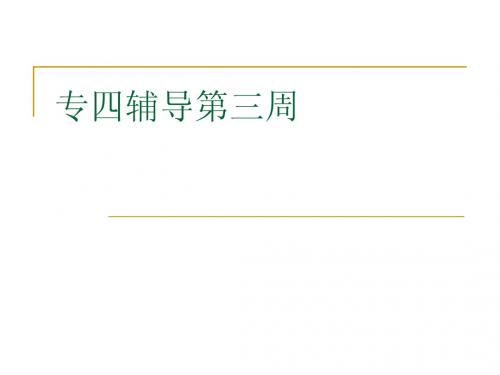
反义疑问句
反意疑问句的基本构成形式是: 反意疑问句的基本构成形式是: 陈述句+动词 肯定或否定)+主语 动词(肯定或否定 主语? 陈述句 动词 肯定或否定 主语?如: ①She often has lunch at school, doesn’t she? ②You don’t like sports, do you?
逃命,逃跑 flee 绝望地,疯狂的 desperately 幸存者 survivor 灾难 catastrophe 占优势的, 支配的 dominant 不可避免的 unavoidable 繁荣昌盛的 prosperous
36-43 irresponsibly avoid minimum unpaid purchases withdraw exceed punishment 44 Congress has threatenst what critics call deceptive behavior by lenders 45. Yet getting a credit card in the United States has become a lot easier for most people 46. Many cards offer low rate at first, especially if people agree to move their balance from another card
16 当陈述部分含有情态动词must时,我们便要分析 一下must的含义。 ① 如果must 作“一定;要;必须”讲,反意疑问句 须用mustn‘t或needn’t; ② 而当must作推测意义“一定是;必定”讲时,反 must 意疑问句则需根据must后的动词原形选用相应的形式。 例如: mustn't he ? He must work hard at physics, Tom must be at home, isn’t he ?
专四语法三:反义疑问句
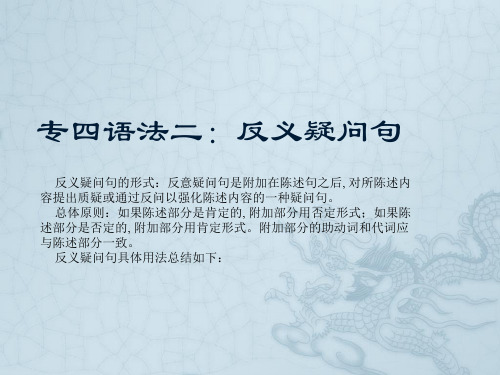
五、若陈述部分是由neither…nor…, either…or…, both…and…, not only…but also…等连词连接的两个名词或代词做句子主 语时,疑问部分的主语用复数代词代替。 例如:Both Lucy and Lily came to this party, didn't they? Not only Kate but also Jane likes dancing, don't they? Either you or Li Ping is going to the meeting, aren't you?
十四、在陈述部分中,Let's 引导的祈使句若是肯定 句,疑问部分用"shall we?"; Let's 引导的祈使句 若是否定句,疑问部分用"OK?"或"all right?". 例 如:Let's go to school, shall we? Let's not go to see the film, OK? /all right? 注:Let's 引导的祈使句若是肯定句,疑问部分间 或可用"shan't we?", 但含义和"shall we"有区别。 试比较:Let's go dancing, shall ↗ we? 咱们去跳 舞,好吗?(征求意见,读时用升调。) Let's go dancing, shan't ↘ we? 咱们该去跳舞 了吧?(提醒对方,读时用降调。)
四、若陈述部分的主语是one时,疑问部分 的主语常用"one"代替,偶尔用"you"代替。 例如:One can't know what will happen in the future, can one? /can you? One should learn more knowledge now, shouldn't one? /shouldn't you?
反义疑问句知识点
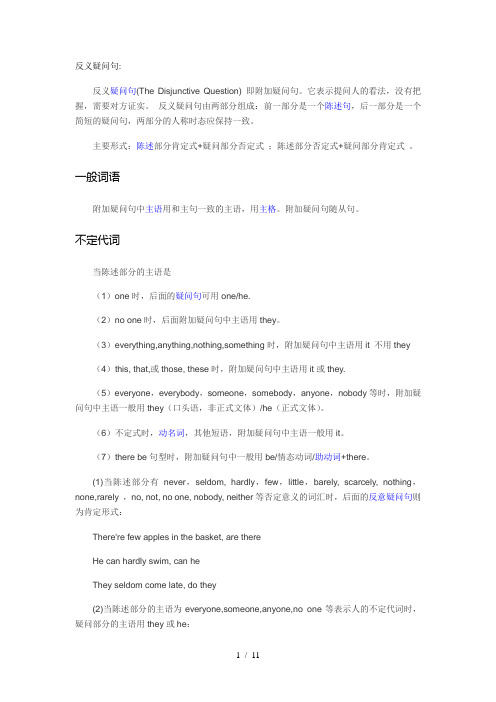
反义疑问句:反义疑问句(The Disjunctive Question) 即附加疑问句。
它表示提问人的看法,没有把握,需要对方证实。
反义疑问句由两部分组成:前一部分是一个陈述句,后一部分是一个简短的疑问句,两部分的人称时态应保持一致。
主要形式:陈述部分肯定式+疑问部分否定式;陈述部分否定式+疑问部分肯定式。
一般词语附加疑问句中主语用和主句一致的主语,用主格。
附加疑问句随从句。
不定代词当陈述部分的主语是(1)one时,后面的疑问句可用one/he.(2)no one时,后面附加疑问句中主语用they。
(3)everything,anything,nothing,something时,附加疑问句中主语用it 不用they(4)this, that,或those, these时,附加疑问句中主语用it或they.(5)everyone,everybody,someone,somebody,anyone,nobody等时,附加疑问句中主语一般用they(口头语,非正式文体)/he(正式文体)。
(6)不定式时,动名词,其他短语,附加疑问句中主语一般用it。
(7)there be句型时,附加疑问句中一般用be/情态动词/助动词+there。
(1)当陈述部分有never,seldom, hardly,few,little,barely, scarcely, nothing,none,rarely ,no, not, no one, nobody, neither等否定意义的词汇时,后面的反意疑问句则为肯定形式:There're few apples in the basket, are thereHe can hardly swim, can heThey seldom come late, do they(2)当陈述部分的主语为everyone,someone,anyone,no one等表示人的不定代词时,疑问部分的主语用they或he:Everyone in your family is a teacher, aren’t they\isn't he?(3)当陈述部分的主语为everything,something,anything.nothing等表示物的不定代词时,疑问部分的主语用it:Something is wrong with your watch, isn’t it(4)当陈述部分含有否定意思的词是unhappy,dislike,unfriendly,等含有否定词缀的派生词,也就是有un,dis,no-前缀、-less后缀等含有词缀而意思否定的词,当做肯定句处理,疑问部分要用否定形式。
专四反义疑问句的用法归纳
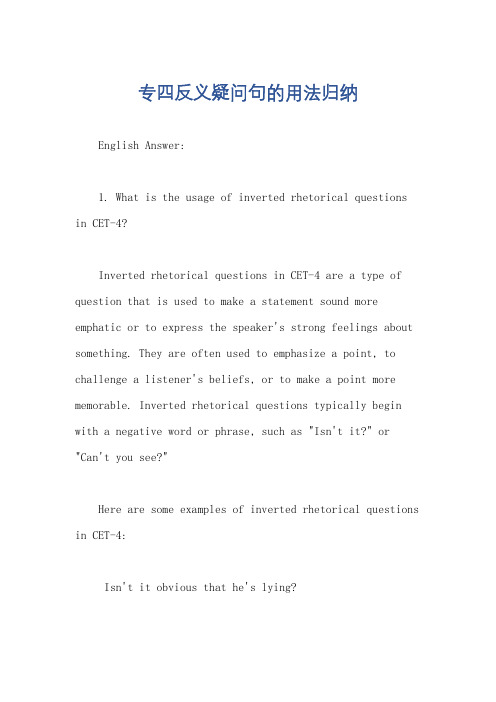
专四反义疑问句的用法归纳English Answer:1. What is the usage of inverted rhetorical questions in CET-4?Inverted rhetorical questions in CET-4 are a type of question that is used to make a statement sound more emphatic or to express the speaker's strong feelings about something. They are often used to emphasize a point, to challenge a listener's beliefs, or to make a point more memorable. Inverted rhetorical questions typically begin with a negative word or phrase, such as "Isn't it?" or "Can't you see?"Here are some examples of inverted rhetorical questions in CET-4:Isn't it obvious that he's lying?Can't you see that this is wrong?Don't you think that this is important?Inverted rhetorical questions can be a powerful toolfor expressing your thoughts and feelings. They can help you to make a point more effectively and to leave a lasting impression on your listener.2. What are some of the benefits of using inverted rhetorical questions in CET-4?There are several benefits to using inverted rhetorical questions in CET-4. These benefits include:They can make your point sound more emphatic. Inverted rhetorical questions can help you to emphasize a point and to make it more memorable.They can challenge a listener's beliefs. Inverted rhetorical questions can be used to challenge a listener's beliefs and to get them to think about something in a newway.They can make a point more memorable. Inverted rhetorical questions can help you to make a point more memorable and to leave a lasting impression on your listener.3. What are some of the drawbacks of using inverted rhetorical questions in CET-4?There are a few drawbacks to using inverted rhetorical questions in CET-4. These drawbacks include:They can sound too confrontational. Inverted rhetorical questions can sometimes sound too confrontational and can make a listener feel defensive.They can be difficult to use effectively. Inverted rhetorical questions can be difficult to use effectively and can sometimes come across as awkward or unnatural.They can be overused. Inverted rhetorical questionscan be overused and can become repetitive and boring.Overall, inverted rhetorical questions can be a powerful tool for expressing your thoughts and feelings in CET-4. However, it is important to use them sparingly and to use them effectively.中文回答:1. 专四反义疑问句的用法。
反义疑问句讲解及答案

反义疑问句讲解及答案反义疑问句是一种附加疑问句,用于表示提问人的不确定或需要对方证实的看法。
这种句型由两部分组成,即陈述句和简短的疑问句,两部分的人称时态应保持一致。
陈述部分为肯定式时,疑问部分为否定式,反之亦然。
例如,昨天她病了,是吗?你没去,是吧?在特殊情况下,祈使句也可以构成反义疑问句。
通常情况下,祈使句后会加上will you或won't you,用于表示请求或提醒对方注意。
当祈使句以Let开头时,反义疑问句有两种情况:以shall we或shan't we结尾,或以will you或won't you结尾。
例如,回家吧,好吗?让我试一试,行吗?当陈述部分含有I think (believe。
suppose。
)that。
结构时,反义疑问句的主语必须是第一人称,并且须与从句的主、谓语保持一致。
如果是非第一人称,则反义疑问句的主语应与主句的主语相一致。
当陈述部分为I(We) don’t think(believe。
suppose。
consider)+that从句时,问句部分的动词和主语仍与that从句保持一致且用肯定式。
例如,我认为他不会来,对吗?他认为她会来,不是吗?我们不相信这个消息是真的,是吗?When using a statement in the form of subject + said (told。
reported。
asked。
) + that clause for a tag n。
the verb and subjectof the n part should agree with those of the main clause。
For example:①They said that you had finished your work。
didn't they。
(Not "hadn't you?")②Kate told you that she would go there。
专四语法 5 反义疑问句

6. 当陈述部分是主从复合句,附加疑问部分一般应 与主句的主语和谓语动词一致;但是,当陈述部 分的主句是I think, I suppose, I suspect, I imagine, I expect,I believe等结构时,附加疑问部分往往 与宾语从句中的主语和谓语动词保持对应关系, 但要注意否定的转移。
4.当陈述部分带有情态动词must
表示“必须”时,疑问部分用mustn’t.如 You must work hard next term,
_m_u__s_tn_’_t _y_o_u___?
mustn’t I
I must answer the letter,_________?
但若表推测这层含义时,不能用must, •陈述部分的谓语是“must+ have done”, 表示对过去情况的猜测时,附加 疑问句中的动词部分需用did(有明确的 时间状语) 或have/ has(无明确的过去 时间状语或有与现在相关的时间状语)。
He was unsuccessful,__w_a_s_n__’t_h_e__? Tom dislikes the book,__d_o_e_s_n_’_t_h_e_?
3. 当陈述部分是并列句,附加疑问句 则需和就近的分句的主语和谓语一致。
Xiao Lin has been writing letters all afternoon but he should finish them now,___s_h_o_u_l_d_n_’t__h_e_?
4. 如果陈述部分用I’m…结构,附加疑 问部分一般用aren’t I。如: I am strong and healthy ,a_r_e_n_’_t _I ?
5. 当陈述句为there be结构时,附加疑 问句中的主语也用there。如: There’s no help for iti,s__t_h_e_re___? There’s something wrong, ___i_s_n_’t__th_e_r_e_?
- 1、下载文档前请自行甄别文档内容的完整性,平台不提供额外的编辑、内容补充、找答案等附加服务。
- 2、"仅部分预览"的文档,不可在线预览部分如存在完整性等问题,可反馈申请退款(可完整预览的文档不适用该条件!)。
- 3、如文档侵犯您的权益,请联系客服反馈,我们会尽快为您处理(人工客服工作时间:9:00-18:30)。
2.助动词 ? 情态动词?Need 反意疑问句的陈述部分谓语有need时,need做情态动词,
附加疑问句仍用need,need做实义动词时,附加问句用助动词do。 They needn't make such a loud noise, need they? He needs the money for his son’s education, doesn’t he?
Let 后接非us之外的人称如me、him、her、them等时, 附加问句用will you。
let him go, will you? let me attend the farewell party, will you?
There+be句型的反意疑问句 There+be句型的反意疑问句,附加问句用be there/be not
wasn’t it?
感叹句后的附根据单复数决定,用it /they指代。
What an interesting story, isn't it? What a funny man, isn't he? How silly they are, aren't they?
6.助动词 ? 情态动词?Ought to 反意疑问句的陈述部分为ought to时,附加问句用助动词should.
She ought to go by plane, shouldn't she? We ought not to laugh at others’ mistakes, should we?
I hope+宾语从句结构,附加问句用don't you。 I hope that they study hard, don’t you?
I am interested in it, aren't I?
人称和数 (2) 陈述部分主语是everything、nothing、something等时看 作单数,附加问句用it指代。 陈述部分主语是everyone、everybody、nobody、 somebody、someone、no one 、anybody、any one等 时看作复数,附加问句用they指代。 陈述部分主语是不定代词 one时,附加问句用one指代。
3.助动词 ? 情态动词?Had better
反意疑问句的陈述部分为had better时,附加问用助动词had。 You had better go at once, hadn't you? We’d better call off our appointment, hadn’t we?
4.助动词 ? 情态动词?Would rather 反意疑问句的陈述部分为would rather时,附加问句用情态动词 would。
主从复合句 I think (suppose…)宾语从句结构,附加问句反意从句分 两种情况;
⑴前肯定句,后用否定句。 I think that he is serious, isn’t he ? ⑵前有否定句,后面附加问句用肯定(I don't think)。 I don’t suppose that she is serious, is she? They think Mary will pass the examination, don’t they?
祈使句后面的附加问句 (1) 祈使句后面的附加问句,分三种情况; ⑴表客气、委婉、邀请、劝诱、愿望等时,用won't
you 。 Have a cup of coffee, won't you? ⑵表命令、强制的要求、请求时,用will you。 Do it at once, will you? ⑶否定祈使句用will you 。 Don't close the door, will you?
there?
This/that/It is/was the third time that句型 This/that/It is/was the third time that等句型中,反意主句,用
it指代。 This is the third time this week he has been late, isn’t it? It was the second time that she had been to the Great Wall,
祈使句后面的附加问句 (2) Let's 和let us后面的附加问句,分两种情况;
⑴let's包括对方在内,用shall we 或shan't we。 let's go to the movies, shall we?
⑵let us不包括对方在内,用will you 或won‘t you。 let us go to the movies, will you ?
人称和数 (3) Nothing is amazing there, is it? Something will have to be done about the price, won't it? Nobody is leaving tomorrow, are they? Everyone hopes to get promoted, don't they? Someone left their umbrella in the bus, didn't they? One can't be too careful, can one?
7.助动词 ? 情态动词?Must 反意疑问句的陈述部分有must,附加问句分三种情况:
⑴must do—mustn't ⑵must be—随人称用系动词一般现在时 ⑶must have done—didn't ①We must book the ticket in advance, mustn‘t we? (必须) ②She must be in the office, isn’t she? (肯定)对现在事情 的肯定猜测。 ③He must have done his homework, didn‘t he? (肯定)对过 去事情的肯定猜测。
You'd rather not do it, would you? She would rather die than surrender to the enemy, wouldn’t she? 5.助动词 ? 情态动词?Used to 反意疑问句的陈述部分为used to时,附加问句用助动词did。 You used to stay up late every evening watching TV, didn’t you?
Tag Questions 反意疑问句
1.助动词 ? 情态动词?Have to
*反意疑问句的陈述部分谓语有have to时,附加疑 问句通常用助动词do。 *You have to study hard, don't you? *I don’t have to get up early, do I? *They had to obey the rules and regulations of the school, didn’t they? *She didn’t have to do it herself, did she?
there,由主语人称时态和数决定。 There won't be any trouble, will there? There's not much news in today's paper, is there? There has been much confusion since his arrival, hasn’t
8.助动词 ? 情态动词?Wish 反意疑问句的陈述部分是wish时,附加问句用情态动词may。 I wish to shake hands with you, may I?
人称和数 (1) 陈述部分主语是"I"时,附加问句的人称分二种情况: ⑴I hope that…, don't you?
I can't believe it, can you? ⑵I will be 14 tomorrow, aren't I?
